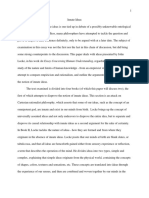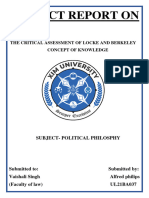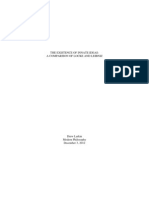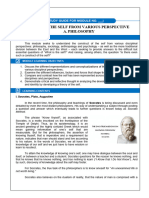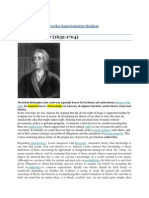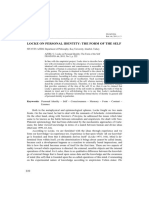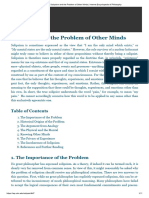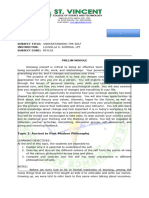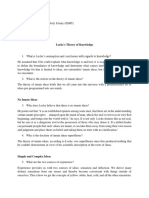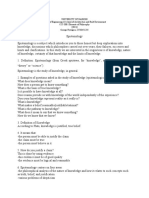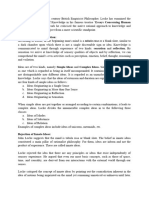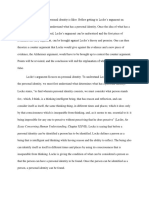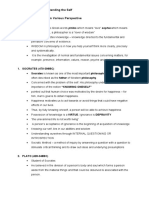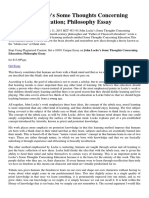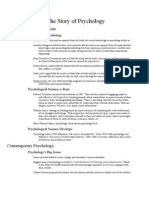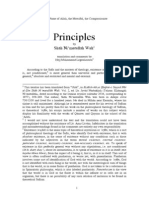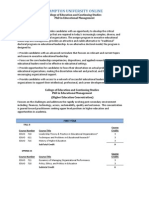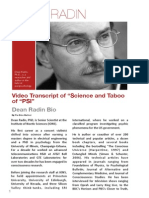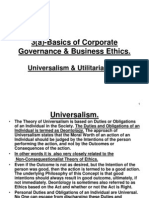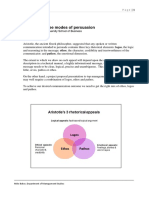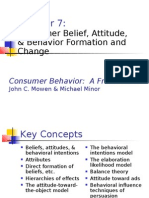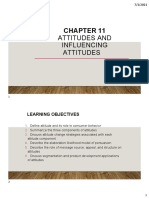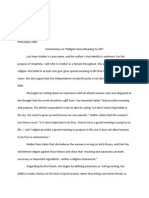John Locke
John Locke
Uploaded by
Muhammad HammadCopyright:
Available Formats
John Locke
John Locke
Uploaded by
Muhammad HammadOriginal Description:
Copyright
Available Formats
Share this document
Did you find this document useful?
Is this content inappropriate?
Copyright:
Available Formats
John Locke
John Locke
Uploaded by
Muhammad HammadCopyright:
Available Formats
John Locke
What is meant by innate ideas? Examine the arguments given by Locke to refute the existence of innate ideas?
Give an account of Lockes criticism of innate ideas
Theory of Innate Ideas According to Locke, the originator of empiricism, the mind is a tabula rasa or blank plate. Locke does not accept the theory of innate ideas, for had ideas been innate they should have been known to children as well as to insane individuals. People who believe that ideas are innate are normally lazy, for they want to avoid the effort of searching for ideas and for that reason like to presume that they are innate. Secondly, once it has been established that ideas are innate, it becomes impossible to analyse them. And as they cannot be analysed it becomes possible for some people to dominate others by not answering any questions. According to the theory of innate ideas, when man is born he inherits a set of ideas that have been impressed upon his soul before his birth. It should also be kept clearly in mind that Lockes criticism of the theory of innate ideas applies to the theories of the British Platonists and Lord Herbert, but not to Descartes philosophy.
Proofs against innate ideas In order to disprove the theory of innate ideas Locke tried to establish the fact that man can possess all undeniable knowledge by the application of his normal natural powers that no innate ideas are required to assist this process. All experience is gained through the senses. Locke presents the following arguments against the theory of innate ideas: 1. Why do children and mad people have no experience of innate ideas In disproving the existence of innate ideas that are universal in character, Locke has objected that if any truth is impressed upon the soul, then the soul should be aware of it. Putting it differently, it cannot be claimed that the soul can remain unaware of any truths
PHILOSOPHY
www.visioniasonline.com
by ANOOP KUMAR SINGH
# 9650617807, 9968029039
Email : ajay_uor@yahoo.com
that have been impressed upon it or have been part of it since its creation. Hence, if the soul does possess some innate ideas then children and madmen should also be aware of them, but they are not. 2. Innate ideas should precede all experience and intellectual development If there are some innate ideas, by implication, they should be prior to any acquired knowledge. On the other hand, it has been seen that ideas that are said to be innate normally follow or come after considerable knowledge which children possess. This knowledge is gained by experience. Now if it is held knowledge of these innate ideas occurs when the mind has gone through certain development, it becomes even more difficult to prove their innate character. Another argument put forward to support the theory of innate ideas is that they are accepted as true and immutable the moment one becomes conscious of them. This, too, cannot be accepted as strictly tenable for in experience knowledge will be equated with ideas that originate in experience and are acquired. 3. Space and time, relative ethical and religious concepts cannot be innate - Some people hold that ethical and moral or religious concepts are innate, and try to use them as examples in order to prove the theory of innate ideas. But Locke has demonstrated that in fact, no religious or ethical idea can be said to be universal. Religious and ethical concepts are influenced by time and space. Hence they cannot be used to prove the theory if innate ideas. 4. Innate ideas cannot be known in the absence of external influence One argument put forward in support of the theory of innate ideas is that these ideas are destroyed and even destroyed by nature, education or other external influence. This argument can be objected to. It follows that whenever such external influences are absent these innate ideas should be known, that is, the individual should become aware of them. Children and in same individuals are not influenced by external factors
PHILOSOPHY
www.visioniasonline.com
by ANOOP KUMAR SINGH
# 9650617807, 9968029039
Email : ajay_uor@yahoo.com
and hence they should be the first to realize the presence of innate ideas but they do not do so.
Having argued against the theory of innate ideas successfully Locke comes to the conclusion that this concept is baseless.
Lockes theory of Knowledge Lockes criticisms of the theory of innate ideas present only negative aspect of his theory of knowledge. On the positive side, the natural corollary of his arguments is that no ideas are innate, and hence all knowledge is acquired. It is learnt from experience. But it should be noticed that although he refutes the theory of innate ideas Locke does not deny that the minds power of acquiring knowledge is innate. According to him the mind is like a bland plate or piece of paper upon which nothing is inscribed. Mens mind acquires knowledge through two sourcessensations and thought. By sensation Lock means the process called perception in psychology. Thought provides man with knowledge of internal ideas, as in the process called introspection in psychology. It provides knowledge of such states of mind as pain, pleasure, doubt, determination etc. Thought is therefore the perception of internal mental states. Ideas that reach the mind through sensation and through sensation and thought exhibit the following three characteristics:
1. These ideas are simple Our different sense organs sent individual sensation to the mind one at a time.
2. They are unrelated Simple ideas are scattered and they have to be tied into different kinds of system sand organizations.
When simple ideas are being absorbed the mind in inactive, but Locke grants that the mind has the power to add or subtract these ideas and to make complex ideas out of the simple ones. Perception of the difference or similarity between ideas amounts to knowledge according to Locke. Knowledge itself is not idea but the relation between the ideas and hence it cannot transcend idea themselves. Hence, there is no knowledge prior to experience, all knowledge PHILOSOPHY
www.visioniasonline.com
by ANOOP KUMAR SINGH
# 9650617807, 9968029039
Email : ajay_uor@yahoo.com
comes after experience. And as Locke has put it, there is nothing in the mind that was not previously in sensation. Before a complex idea can be evolved, it is essential for the mind to receive simple ideas through the medium of sensations. The mind itself cannot provide knowledge in the absence of this sensory knowledge. Although the mind is inactive in the perception of qualities of external objects, when it tries to perceive internal actions the mind has to exert itself. In the case of children, knowledge is first provided by simple ideas originating in sensations, only later does thinking develop the complex ideas. Locke distinguishes between internal and external perception in the manner. Falkenberg, the historian points out that this dichotomy between sensation and thought has its origin in the dualism of Descartes.
PHILOSOPHY
www.visioniasonline.com
by ANOOP KUMAR SINGH
# 9650617807, 9968029039
Email : ajay_uor@yahoo.com
You might also like
- Hand Out 1 - The Self From Various PerspectivesDocument2 pagesHand Out 1 - The Self From Various PerspectivesLorlie Castro83% (18)
- Summary of W. Graham AstleyDocument4 pagesSummary of W. Graham AstleyDr-Akshay BhatNo ratings yet
- Philosophy of Mind - Locke's Arguments Against Innate Ideas and KnowledgeDocument5 pagesPhilosophy of Mind - Locke's Arguments Against Innate Ideas and KnowledgeVictoria Ronco57% (7)
- The Philosophical Enterprise (Readings) PDFDocument64 pagesThe Philosophical Enterprise (Readings) PDFBench BayanNo ratings yet
- A Review of B. Alan Wallace's The Taboo of Subjectivity'Document8 pagesA Review of B. Alan Wallace's The Taboo of Subjectivity'jovani333No ratings yet
- Mythology, Madness, and Laughter PDFDocument209 pagesMythology, Madness, and Laughter PDFHelenoPapadopoulosNo ratings yet
- Locke PDFDocument6 pagesLocke PDFMichael SylvesterNo ratings yet
- Ul21ba037 - IPP ProjectDocument9 pagesUl21ba037 - IPP Projectpriyanshukumarsingh191No ratings yet
- LockeDocument5 pagesLockeScribbler100% (1)
- A Filosofia de John Locke 18Document10 pagesA Filosofia de John Locke 18FélisFranciscoTavelinNo ratings yet
- John Locke - An Empirical Theory of Knowledge-1Document3 pagesJohn Locke - An Empirical Theory of Knowledge-1Betty Njeri Mbugua100% (2)
- EmpiricismDocument8 pagesEmpiricismIrfan U Shah75% (4)
- Locke vs. Leibniz On Innate IdeasDocument9 pagesLocke vs. Leibniz On Innate IdeasDrew Larkin100% (1)
- SEMINAR TOPIC PRESENTATION EditedDocument21 pagesSEMINAR TOPIC PRESENTATION Editedfavourclems123.comNo ratings yet
- Lecture 8. - The Sources of Our Thinking.: SyllabusDocument18 pagesLecture 8. - The Sources of Our Thinking.: Syllabustruthwarrior007No ratings yet
- UTS - Module 1 RevisedDocument6 pagesUTS - Module 1 RevisedUndisputed EraNo ratings yet
- InnatismDocument16 pagesInnatismNathan HolzsterlNo ratings yet
- The Unacceptibility of The Existence of So-Called Innate Ideas To An Empiricist PhilosopherDocument8 pagesThe Unacceptibility of The Existence of So-Called Innate Ideas To An Empiricist PhilosopherAshiqur RafiNo ratings yet
- Vida de J. LockeDocument12 pagesVida de J. Lockecesarb07No ratings yet
- Psych CompilationDocument66 pagesPsych CompilationLovenyl KimNo ratings yet
- Explore Two Criticisms of RationalismDocument1 pageExplore Two Criticisms of RationalismAngus ParkNo ratings yet
- Leibniz Theory of KnowledgeDocument4 pagesLeibniz Theory of KnowledgeEnrique TeodoroNo ratings yet
- What Is Knowledge?Document8 pagesWhat Is Knowledge?js ylenaNo ratings yet
- Uts Lesson 1 Philosophical PerspectiveDocument44 pagesUts Lesson 1 Philosophical Perspectivejpastorfide20No ratings yet
- GE1 Module 1 PhilosophyDocument6 pagesGE1 Module 1 PhilosophyJohn Vincent Mina OcampoNo ratings yet
- Locke Representative RealismDocument21 pagesLocke Representative RealismAnees Ur Rehman0% (1)
- Unit 1 Mirroring Mind (Descartes, Locke, Hume) : 1.0 ObjectivesDocument13 pagesUnit 1 Mirroring Mind (Descartes, Locke, Hume) : 1.0 Objectivesrajeev kumarNo ratings yet
- 222 239 PDFDocument18 pages222 239 PDFchano bombitaNo ratings yet
- Solipsism and The Problem of Other Minds - Internet Encyclopedia of PhilosophyDocument11 pagesSolipsism and The Problem of Other Minds - Internet Encyclopedia of PhilosophyultranecplusNo ratings yet
- Somosa Psych1 Prelim Module - Leganes - Bsa - 1 AceDocument18 pagesSomosa Psych1 Prelim Module - Leganes - Bsa - 1 AceJohnny PadernalNo ratings yet
- Locke's Theory of KnowledgeDocument3 pagesLocke's Theory of KnowledgeWinston QuilatonNo ratings yet
- Introduction To EpistemologyDocument4 pagesIntroduction To EpistemologyBetty Njeri MbuguaNo ratings yet
- Critiquelocke'sidea PDFDocument10 pagesCritiquelocke'sidea PDFSiti ShahidaNo ratings yet
- Philosophy NotesDocument27 pagesPhilosophy NotesMariah Divina VillasurNo ratings yet
- LockeDocument3 pagesLockeVanshika PawarNo ratings yet
- AnEssayOnJohnLocke PDFDocument12 pagesAnEssayOnJohnLocke PDFCîmpeanu MădălinaNo ratings yet
- Reviewer in UtsDocument23 pagesReviewer in UtsBenedetta GameplayNo ratings yet
- EmpiricismDocument11 pagesEmpiricismAakanksha SawaithulNo ratings yet
- Vaishali Singh ProjectDocument9 pagesVaishali Singh Projectpriyanshukumarsingh191No ratings yet
- Unit 1Document11 pagesUnit 1yaminiNo ratings yet
- Module 3Document8 pagesModule 3Richard PalaylayNo ratings yet
- PDFDocument4 pagesPDFSusmita GhoshNo ratings yet
- Enrichment Activities Group 2Document5 pagesEnrichment Activities Group 2Karl GeeloNo ratings yet
- Philosophy Paper 1Document3 pagesPhilosophy Paper 1api-404836529No ratings yet
- MindreadingDocument21 pagesMindreadingAyşe Fırat Dalak0% (1)
- Final Finals FinalsDocument3 pagesFinal Finals FinalsEmmanuel John CochingNo ratings yet
- Page 14 Reflection and Research KatDocument5 pagesPage 14 Reflection and Research KatRye Felimon100% (4)
- Wa0036.Document797 pagesWa0036.Yaar 1510No ratings yet
- Module 3Document6 pagesModule 3Richard PalaylayNo ratings yet
- Understanding Self Lesson 1Document5 pagesUnderstanding Self Lesson 1Beatriz Naveen S Antonio50% (2)
- Epistemology NotesDocument8 pagesEpistemology NotesKing Gaspar CalmaNo ratings yet
- Empiricism 31052022 012304pm 16122022 021159pm 19052023 072941pm 06122023 060532pmDocument35 pagesEmpiricism 31052022 012304pm 16122022 021159pm 19052023 072941pm 06122023 060532pmnidaz9103No ratings yet
- Understanding The Self Week 1 PhilosophyDocument21 pagesUnderstanding The Self Week 1 PhilosophyJeya Plays YTNo ratings yet
- Lou Monica G. Empelis - UTS - Chap1 - Lesson 3Document4 pagesLou Monica G. Empelis - UTS - Chap1 - Lesson 3Lou Monica Empelis100% (1)
- Who Is John LockeDocument5 pagesWho Is John LockeAngelica LapuzNo ratings yet
- Unself The Philosophical PerspectiveDocument35 pagesUnself The Philosophical PerspectiveGene Jeric Janolino BuenaflorNo ratings yet
- Do You Really Know Yourself?Document64 pagesDo You Really Know Yourself?Angela Martires100% (2)
- John Lockes Some Thoughts Concerning Education Philosophy EssayDocument2 pagesJohn Lockes Some Thoughts Concerning Education Philosophy EssayEzekiel NeutronNo ratings yet
- The Self Is Consciousness - Locke - J ChaffeeDocument5 pagesThe Self Is Consciousness - Locke - J ChaffeeAlyson Fortuna100% (1)
- Prologue OutlineDocument2 pagesPrologue OutlineYasmin KhalilNo ratings yet
- Philosophy of John Locke On EducationDocument3 pagesPhilosophy of John Locke On EducationLARAMAE ESMANo ratings yet
- Ge1 Module 1 PhilosophyDocument19 pagesGe1 Module 1 PhilosophyJohnloyd TamondongNo ratings yet
- Quick Answer to Who You Are through Mind-Body Inquiry and Philosophies of Mind, Soul and SpiritFrom EverandQuick Answer to Who You Are through Mind-Body Inquiry and Philosophies of Mind, Soul and SpiritNo ratings yet
- Genres in Academic WritingDocument9 pagesGenres in Academic WritingMuhammad Hammad100% (1)
- Tafseer-of-Surah-Al-Hadeedتفسیر سورۃ الحدیدDocument366 pagesTafseer-of-Surah-Al-Hadeedتفسیر سورۃ الحدیدmusaNo ratings yet
- Book Shah Nemat UllahDocument14 pagesBook Shah Nemat UllahMuhammad HammadNo ratings yet
- The Philosophy of Law An ExpositionDocument150 pagesThe Philosophy of Law An ExpositionJanessa-johnjane BongkahigNo ratings yet
- Hampton University Online: Program OverviewDocument10 pagesHampton University Online: Program OverviewMuhammad HammadNo ratings yet
- Divine Command Theory Philosophy PDFDocument13 pagesDivine Command Theory Philosophy PDFMuhammad HammadNo ratings yet
- Sayings of Nosha Ganj Baksh v1Document9 pagesSayings of Nosha Ganj Baksh v1Muhammad HammadNo ratings yet
- MSchlick The Turning Point in Philosophy 1931 PDFDocument4 pagesMSchlick The Turning Point in Philosophy 1931 PDFMuhammad HammadNo ratings yet
- ZamzaDocument22 pagesZamzaMuhammad HammadNo ratings yet
- AA English GRE Suggested Reading ListDocument4 pagesAA English GRE Suggested Reading ListMuhammad HammadNo ratings yet
- Hampton University Online: Program OverviewDocument10 pagesHampton University Online: Program OverviewMuhammad HammadNo ratings yet
- Parallelism in Technical WritingDocument17 pagesParallelism in Technical WritingMuhammad Hammad100% (1)
- Implementasi Nilai Pancasila Dalam Kehidupan Mahasiswa Fakultas Pertanian Universitas Brawijaya Di MalangDocument7 pagesImplementasi Nilai Pancasila Dalam Kehidupan Mahasiswa Fakultas Pertanian Universitas Brawijaya Di MalangOtto H. SubiantoroNo ratings yet
- How One Ought To LiveDocument4 pagesHow One Ought To LiveVictor HoustonNo ratings yet
- UPD - BA Philosophy CurriculumDocument3 pagesUPD - BA Philosophy CurriculumPaigeNo ratings yet
- Dean Radin Google TalkDocument4 pagesDean Radin Google TalkTarikNo ratings yet
- The Metaphor of Women As Truth in NietzscheDocument14 pagesThe Metaphor of Women As Truth in NietzscheAslan AndersonNo ratings yet
- 1-Basics of Corporate Governance &business Ethics..Ppt EaefsfDocument5 pages1-Basics of Corporate Governance &business Ethics..Ppt EaefsfIna PawarNo ratings yet
- How To Get Rid of Religion: An Inconvenient Liberal Paradox by Floris Van Den BergDocument119 pagesHow To Get Rid of Religion: An Inconvenient Liberal Paradox by Floris Van Den BergErroll Treslan100% (1)
- Aristotles Three Modes of PersuasionDocument3 pagesAristotles Three Modes of PersuasionJoy Grace DuremdesNo ratings yet
- LuftDocument460 pagesLuftruben83100% (1)
- Chapter 14 Social PsychologyDocument41 pagesChapter 14 Social PsychologyArshia HematpoorNo ratings yet
- Two Arguments Against Ethical EgoismDocument18 pagesTwo Arguments Against Ethical EgoismHuss K. SaadNo ratings yet
- Attitudes Part 2Document36 pagesAttitudes Part 2Freedel LogieNo ratings yet
- Top PDFDocument17 pagesTop PDFIsmael Sebastian Valenzuela SotoNo ratings yet
- Consumer Behavior PP Chapter 7Document35 pagesConsumer Behavior PP Chapter 7tuongvyvyNo ratings yet
- UCSP Unit 14 Religion and Belief SystemsDocument40 pagesUCSP Unit 14 Religion and Belief SystemsTin CabosNo ratings yet
- Chapter 11Document19 pagesChapter 11THƯ LÊNo ratings yet
- Paul Tilich: Two Types of Philosophy of ReligionDocument13 pagesPaul Tilich: Two Types of Philosophy of Religiongnomgnot7671100% (1)
- Final Draft - EvolutionDocument3 pagesFinal Draft - Evolutionapi-284571698No ratings yet
- Club Shopping FormDocument2 pagesClub Shopping FormRonn De TorresNo ratings yet
- Eriksson Qualitative MethodsDocument18 pagesEriksson Qualitative MethodsMuhammad shahid khanNo ratings yet
- Confirmation BiasDocument17 pagesConfirmation BiasHamza IqbalNo ratings yet
- Harvard Government 90fj SyllabusDocument4 pagesHarvard Government 90fj SyllabusJNo ratings yet
- Consumer Attitude Formation and ChangeDocument24 pagesConsumer Attitude Formation and ChangeSaad AzamNo ratings yet
- Lois Hope Walker CommentaryDocument4 pagesLois Hope Walker CommentaryJacob CliftNo ratings yet
- Ethics in Relation To Other SciencesDocument17 pagesEthics in Relation To Other SciencesJove8767% (3)
- Internal Ism and External Ism in Semantics and EpistemologyDocument312 pagesInternal Ism and External Ism in Semantics and EpistemologyKatie Soto100% (4)
- Idealism and EducationDocument8 pagesIdealism and EducationArinal Haqqiyah Ahmad100% (1)






